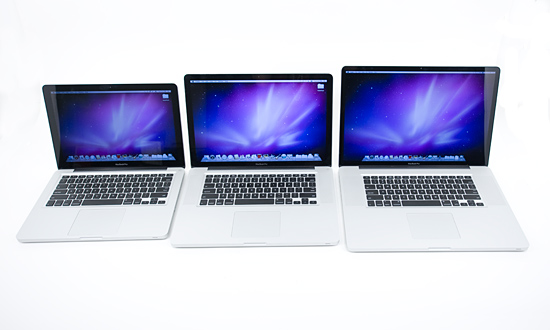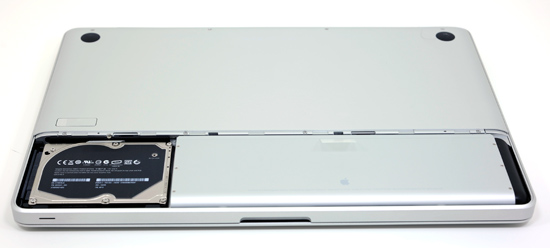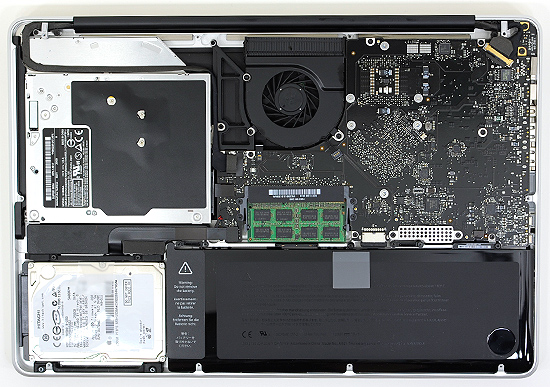Done for 2009: The Holiday MacBook Pro Roundup
by Anand Lal Shimpi on November 10, 2009 12:00 AM EST- Posted in
- Mac
We all knew when mobile Nehalem processors were coming out. I kept referencing Q1 2010 as when you're going to want to replace your MacBook Pro. As far as I was concerned, there was nothing Apple could do to make me recommend anything but wait.
Then this happened:

From the outside it looks like the same unibody MacBook Pro Apple launched at the end of 2008. Look a little closer and you'll realize it's actually a little worse:

The original unibody MacBook Pro
The original unibody MacBook Pro had an easily accessible hard drive bay, a first for Apple's aluminum notebook line. I feel bad for the engineers that worked to make that bay both functional and sleek, because in the updated unibody MacBook Pro it's gone. A brand new feature only sticking around for one generation, that’s gotta hurt. Replacing a hard drive now requires removing no less than 16 screws (10 on the chassis, 2 holding the drive in place and 4 on the drive itself). In the original unibody MacBook Pro it only took five.

The mid 2009 unibody MacBook Pro
The easily accessible HDD bay was a side effect, the point of the sleek removable panel on the elder unibody was to house the replaceable battery. Something that also vanished from the new MacBook Pro.

The new integrated battery (lower right)
Apple did something that no mainstream notebook vendor had dared to do before: kill the removable battery. The rationale was simple: new battery technology allowed batteries to take virtually any shape, and making them fit into user replaceable containers proved to waste a lot of space. Wasted space amounted to larger and heavier notebooks.
It all started with the 17-inch MacBook Pro.










115 Comments
View All Comments
SmCaudata - Wednesday, November 11, 2009 - link
Edit: I meant ASUS Laptop.JimmyJimmington - Wednesday, November 11, 2009 - link
Do people really buy 17 inch laptops? I could never justify spending that much money on something I can't even take to school. Might as well build an amazing desktop... And then use the leftover money to buy a great laptop...The0ne - Wednesday, November 11, 2009 - link
Not many of us would shell out $2500 for one but many of us would for 1/3 the price with similar if not better specs.damianrobertjones - Wednesday, November 11, 2009 - link
Can we have a roundup of the following machinesDell
Toshiba
HP
etc
etc
That would make everything fair.
Zak - Wednesday, November 11, 2009 - link
Not everyone can afford an SSD, SSDs offered by Apple as BTO are crap and overpriced, and a fast 7200rpm HD does make a difference.Z.
Zak - Wednesday, November 11, 2009 - link
" Apple figures someone who wants such a big machine will probably have some fast external storage to connect to it..." And still no SATA? BTW, the screen on the 17" is indeed amazing.Z.
mschira - Wednesday, November 11, 2009 - link
I like the logic you draw with the heavy load test.So that all makes sense.
Some other thing:
Did you check battery time on a Hackintosh?
Like an Acer Timeline get's up to 7 hours on Win7, what can it get when we make it a Hackintosh?
M.
CharonPDX - Wednesday, November 11, 2009 - link
You compare the 17" to an HP and a Dell, which are both monsters. (But, they are nearly 1/3 the price, for noticeably more CPU power.)You compare the 13" to a Dell that is slightly larger. (Compare to the HP Envy 13; then you'll get a definitive Apple win, as the HP costs more than a 13" MBP.)
But you don't do the obvious comparison: 15" MacBook Pro to HP Envy 15.
I think the MacBook Pro would lose out instantly in this comparison. It is what the 15" MacBook Pro *SHOULD* be right now.
For the 17"? You dismiss the Dell and HP as being too big. Yet they both cost less than $1200. And HP offers an identically-sized model that throws in a 1080 screen and Blu-ray player for $1300. For that matter, you can completely max out the HP's specs (fastest mobile Core i7, 8 GB RAM, dual 500 GB hard drives, Blu-ray writer, etc,) before it becomes more expensive than the MacBook Pro. (And then, by only $50.) I'm sorry, but it's not worth the massive loss in features (or $1000, if you take the 'stock' 1080/Blu-ray HP,) to save 1.1 lbs.
ChuckyP83 - Wednesday, November 11, 2009 - link
I think you are missing the point of the article. Comparing a one piece aluminum vault of a laptop to a flimsy, plasticky, lowest-cost-built Dell (or HP or whoever) just doesn't work just on specs buddy. Nobody knows how to build a laptop as solidly as Apple. That is a fact you CANNOT argue (I think Apple patented their manufacturing technique). Apples don't compete on price and specs because the ways they surpass the average PC competition aren't easily quantifiable. Not sure why I am even replying to this guy....The0ne - Wednesday, November 11, 2009 - link
That is subjective. I have many dell laptops and they aren't cheap. I have my 17" with me as a backpack hiking weight in China and it still works afterward. Granted the Macbook quality might be a bit better but when people like you said it in your way you make it out as though Dell or HP has horrible quality build, that the laptop wouldn't last being carrying around, that a drop would kill it, etc. Unless you don't know how to lug around a laptop the build quality is the least of your concern.The bottom line is that most of us are fine with the build quality of Dell, HPs, Acer, etc. But some people don't mind spending A LOT more to have nicer metal pieces and looks. Seriously in the end what would you prefer, function or style?
You're too much of a Apple fanboy. Thank God no one builds laptop, or in more general terms hardware, like Apple. I won't even go into the details of their greatness here. Their hardware is not perfect as you know. Knowing this and claiming no one does it better than they do is fan-boyish.
Apple doesn't have a patent on manufacturing techniques. If they did it would be a very specific process that is not covered by countless generations of manufacturing processes. They could, like Intel, put a freeze on the process to prevent any changes. But this has severe advantages and disadvantages.
"Apples don't compete on price and specs because the ways they surpass the average PC competition aren't easily quantifiable. Not sure why I am even replying to this guy.... "
Who else besides me thinks these sentences is a load of BS? Please respond to this user if you do. Apple don't compete in price and spec because lets see...they are the only ones selling them and thus can dictate the prices? They surpass the average PC competition so they can do whatever they want because the user wouldn't be able to quantify the reasons? O.o
To be honest, I'm not even sure why I'M responding to your post. It's so lame, riddled with false facts it's not even funny. Urgh.